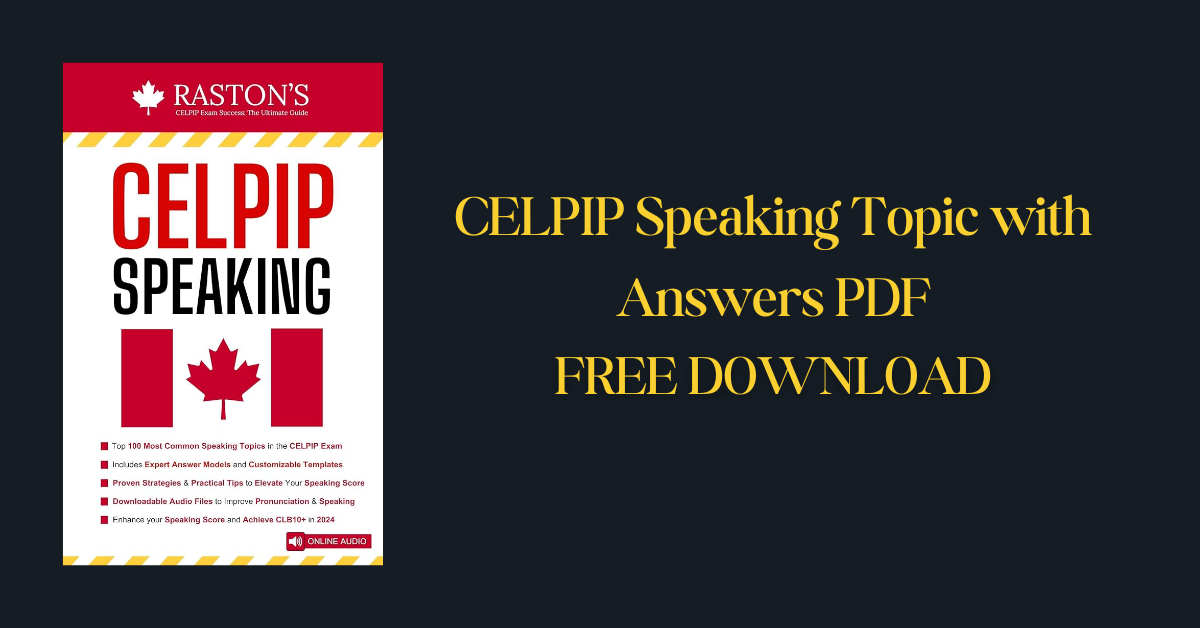The CELPIP Speaking test is designed to assess your ability to communicate effectively in English. Throughout the test, you will engage in a series of speaking tasks that will evaluate your proficiency in various linguistic skills, including pronunciation, vocabulary usage, fluency, and coherence.
The Speaking test consists of eight tasks, each designed to reflect real-life situations you may encounter in English-speaking environments. Your responses will be recorded and assessed by qualified evaluators to determine your level of English proficiency.
Remember to speak clearly, confidently, and express your ideas succinctly to demonstrate your language abilities effectively. Good luck!
| Name of the PDF | CELPIP Speaking Topics with Answers PDF |
| No. of Pages | 31 |
| Language | English |
| Answer PDF | Click here to Download |
Also Download
CELPIP Writing Task 2 Sample PDF
Overview of CELPIP
The Canadian English Language Proficiency Index Program (CELPIP) is a comprehensive English language testing system designed to assess the English language proficiency of individuals who wish to immigrate to Canada, apply for Canadian citizenship, or for those who need to prove their English language proficiency for professional designations or certain types of employment.
The CELPIP tests provide a valid and reliable measurement of a test taker’s English abilities in a variety of everyday situations, such as communicating with coworkers and superiors in the workplace, interacting with friends, understanding newscasts, and interpreting and responding to written materials.
CELPIP is managed by Paragon Testing Enterprises, a subsidiary of the University of British Columbia (UBC). The test is fully computer-delivered, offering test takers the opportunity to complete all test components in one sitting, without additional appointments or interviews.
Types of CELPIP Tests
The Canadian English Language Proficiency Index Program (CELPIP) offers two primary types of tests designed to assess the English language proficiency of individuals planning to immigrate to Canada or apply for Canadian citizenship. Each test is tailored to meet specific immigration and citizenship requirements.
CELPIP-General Test: The CELPIP-General Test is designed for individuals who need to demonstrate their English language proficiency as part of their application for permanent residency in Canada or for certain professional designations. This test assesses four key language skills:
- Listening: Test takers listen to conversations, news items, and discussions, then answer questions about them. This section is designed to gauge how well test takers understand English spoken in various situations.
- Reading: This section includes reading passages on everyday topics and answering questions to assess comprehension and the ability to analyze information.
- Writing: Test takers are required to respond to email prompts and write about their opinions or experiences based on given scenarios. This section evaluates the ability to communicate effectively in written English.
- Speaking: Participants must complete tasks that simulate everyday interactions, such as giving advice, talking about personal experiences, and describing scenes. This part tests the ability to speak English fluently and coherently.
CELPIP-General LS Test: The CELPIP-General LS Test is a shorter version of the CELPIP test, focusing exclusively on listening and speaking skills. It is specifically designed for those applying for Canadian citizenship, as these are the key language skills required for daily communications in Canada. The test includes:
- Listening: Similar to the General Test, this section involves listening to various audio materials and answering questions based on them.
- Speaking: Test takers perform speaking tasks that assess their ability to communicate effectively in English.
Choosing the Right Test
Both tests are recognized by IRCC and offer a computer-delivered format, allowing for a convenient and efficient testing experience. Test takers can choose the test that best fits their immigration or citizenship goals, ensuring they meet the specific language proficiency requirements set by Canadian authorities.
- For Permanent Residency Applications: The CELPIP-General Test is the appropriate choice, as it assesses all four language skills required by Immigration, Refugees and Citizenship Canada (IRCC) and various professional organizations.
- For Canadian Citizenship Applications: The CELPIP-General LS Test is suitable, focusing on listening and speaking skills in line with the citizenship language proficiency requirements.
Understanding the CELPIP Speaking Test
The CELPIP Speaking Test is a crucial component of the CELPIP-General Test, designed to assess a test taker’s ability to communicate effectively in English in everyday situations. It simulates real-life scenarios where spoken English is used, making it highly relevant for those looking to immigrate to or work in Canada.
Structure and Format
The CELPIP Speaking Test is meticulously structured to assess a wide range of speaking skills in various contexts, reflecting everyday scenarios one might encounter in Canada. This part of the CELPIP-General Test is designed to evaluate the test taker’s ability to communicate effectively in English, focusing on fluency, pronunciation, grammar, and the organization of ideas.
- Number of Tasks: 8
- Total Duration: Approximately 15-20 minutes
- Delivery Mode: Computer-delivered, with test takers speaking into a microphone.
- Scoring: Each task is scored on a scale from M (Minimal Proficiency) to 12 (Advanced Proficiency), considering factors like coherence, vocabulary, listenability, and grammar.
Types of Tasks
- Personal Experience or Opinion: Test takers are prompted to talk about their experiences or opinions related to everyday topics. This could involve describing memorable events, discussing preferences, or expressing views on common subjects.
- Describe a Scene: A picture is displayed, and participants are asked to describe various elements and activities happening in the scene. This tests the ability to describe observations and use descriptive language accurately.
- Make Predictions: Given a scenario or a continuation of the scene described in task 2, test takers must make predictions about future outcomes or developments. This assesses the ability to use future tense and speculative language.
- Persuade Someone: This task involves convincing someone to take action or agree with an opinion. It tests persuasive speaking skills and the ability to present arguments coherently.
- Difficult Situations: Test takers describe how they would handle a challenging or uncomfortable situation, testing problem-solving skills and the ability to articulate solutions.
- Express Opinions: Participants are asked to express their opinions on a variety of topics, assessing the ability to construct and articulate personal views clearly.
- Describe an Unusual Situation: This task involves describing an unexpected or unusual event, testing the ability to narrate events and react to hypothetical scenarios.
- Compare and Persuade: Test takers compare two options related to a decision-making scenario and persuade the listener to choose one, testing comparative analysis and persuasive skills.
Timing
- Preparation Time: Before responding to each task, there’s a brief preparation period (about 30 seconds), allowing test takers to organize their thoughts.
- Response Time: The time allocated for responses varies by task but generally falls between 60 to 90 seconds.
How is the CELPIP Speaking Test Scored
The scoring of the CELPIP Speaking Test is designed to assess a candidate’s proficiency in spoken English, focusing on various aspects of language use. Each of the eight tasks in the Speaking section is scored independently, and the scores are then averaged to determine the final speaking score.
Scoring Criteria
The CELPIP Speaking Test evaluates candidates on several key criteria, which include:
- Content and Coherence: The ability to stay on topic, organize thoughts logically, and connect ideas effectively.
- Vocabulary: The range and appropriateness of word choice, as well as the ability to use vocabulary that accurately expresses thoughts and nuances in meaning.
- Listenability: The ease with which the response can be understood by the listener, encompassing aspects such as pronunciation, intonation, and pace of speech.
- Grammar: The accuracy and range of grammatical structures used, including sentence complexity and the correct use of tenses.
Score Levels
CELPIP Speaking scores range from M (Minimal Proficiency) to 12 (Advanced Proficiency), with descriptions for each level that outline the test taker’s ability in terms of the scoring criteria mentioned above. The score levels are:
- M-0: Did not attempt the test or response was off-topic.
- 1-3: Minimal proficiency, demonstrating significant difficulties in spoken English.
- 4-6: Basic to intermediate proficiency, showing some ability to communicate in familiar situations but with limitations.
- 7-9: Adequate to good proficiency, capable of effective communication in most everyday situations.
- 10-12: High to advanced proficiency, demonstrating a strong command of spoken English across a wide range of contexts.
Scoring Process
- Automated Scoring: CELPIP utilizes an automated scoring system that evaluates the spoken responses. This system is designed to objectively assess the criteria mentioned, ensuring consistent and fair scoring across all test takers.
- Holistic Evaluation: Each task is scored holistically, meaning the scorer (or scoring system) considers all aspects of the response—content, vocabulary, listenability, and grammar—to assign a score that reflects the overall proficiency demonstrated in that task.
How to Prepare for the CELPIP Speaking Test
Preparing for the CELPIP Speaking Test involves a strategic approach to improve your English speaking skills, focusing on the specific criteria that the test evaluates. Here are some effective strategies to help you prepare:
Understand the Test Format and Tasks: Familiarize yourself with the structure of the Speaking Test, including the types of tasks you’ll be asked to perform. Understanding the format will help reduce anxiety and improve your performance.
Practice with Sample Tasks: Use official CELPIP preparation materials and online resources to find sample speaking tasks. Practice responding to these tasks within the given time limits to simulate test conditions.
Improve Your Listening Skills: Enhance your listening skills by exposing yourself to English through movies, TV shows, podcasts, and news broadcasts. This will help you better understand various accents and improve your own pronunciation and fluency.
Expand Your Vocabulary: Work on broadening your vocabulary to express yourself more clearly and accurately. Learn new words daily, focusing on synonyms, antonyms, and phrases that are commonly used in spoken English.
Focus on Fluency and Pronunciation: Practice speaking English regularly to improve your fluency. Focus on speaking smoothly without too many pauses or fillers. Work on your pronunciation to ensure that your speech is clear and easily understood.
Record and Review Your Responses: Record your practice responses and listen to them critically. Identify areas for improvement, such as grammar mistakes, pronunciation errors, or lack of coherence, and work on these areas.
Engage in Conversations: Engage in English conversations with native speakers or other learners. This can be through language exchange meetups, online platforms, or speaking clubs. Real-life practice will improve your speaking skills and confidence.
Use Technology: Utilize language learning apps and online platforms that focus on speaking skills. Some apps provide instant feedback on pronunciation and fluency.
Work on Stress and Intonation: Practice using correct stress and intonation patterns in your speech. This will make your speaking more natural and engaging, and can also help convey meaning more effectively.
Get Professional Feedback: Consider taking a preparation course or working with a tutor who specializes in CELPIP. Professional feedback can pinpoint your weaknesses and provide strategies for improvement.
Stay Calm and Confident: Develop strategies to manage test anxiety. Practice relaxation techniques, and remember that speaking naturally and confidently can positively influence your score.
Review Performance Descriptors: Review the CELPIP Speaking Performance Descriptors available on the official CELPIP website. These descriptors give you a clear idea of what is expected at different score levels.
Conclusion
The CELPIP Speaking test evaluates various aspects of language proficiency, including pronunciation, fluency, vocabulary, and coherence. It is essential to practice speaking regularly and familiarize oneself with the test format to perform well.
By focusing on clear communication, maintaining a steady pace, and utilizing a range of vocabulary and grammatical structures, test-takers can effectively demonstrate their English language skills.
With dedication and preparation, success in the CELPIP Speaking test is achievable, opening doors to various opportunities for academic and professional advancement.
FAQs
What is the format of the CELPIP Speaking test?
The CELPIP Speaking test consists of eight tasks, including giving advice, talking about a personal experience, describing a scene, making predictions, comparing and persuading, dealing with a difficult situation, expressing opinions, and describing an unusual situation. These tasks are designed to assess a range of speaking skills in a variety of everyday situations.
How long does the CELPIP Speaking test take?
The CELPIP Speaking test takes approximately 15-20 minutes to complete.
Can I use a pen and paper during the CELPIP Speaking test?
Yes, candidates are allowed to take notes using a pen and paper during the preparation time for each speaking task. However, the use of pen and paper may vary depending on the test center’s policy or the specific format of the test being taken (paper-based or computer-delivered).
Are there any breaks during the CELPIP Speaking test?
No, there are no scheduled breaks during the CELPIP Speaking test. The test is relatively short, so breaks are not typically necessary.
Is there a specific topic that will be covered in the CELPIP Speaking test?
The topics in the CELPIP Speaking test can vary widely but are generally related to everyday life, work, and social situations. Candidates might be asked to speak about personal experiences, give opinions on common topics, or describe and discuss photographs.
How are the speaking tasks graded in the CELPIP Speaking test?
Speaking tasks are graded on a scale from 1 to 12 based on a variety of factors, including pronunciation, fluency, vocabulary, grammar, and coherence. Each task is rated by expert raters who follow standardized criteria to ensure consistency and fairness in scoring.
Can I prepare for the CELPIP Speaking test?
Yes, you can prepare for the CELPIP Speaking test by practicing speaking English in a variety of situations, studying sample questions and answers, taking practice tests, and using preparation materials available from the official CELPIP website or language learning centers.
Can I retake the CELPIP Speaking test if I’m not satisfied with my score?
Yes, you can retake the CELPIP test if you are not satisfied with your score. There is no limit to the number of times you can retake the test, but it’s recommended to prepare thoroughly before attempting the test again.
Is there a specific accent I need to use in the CELPIP Speaking test?
No, there is no specific accent required for the CELPIP Speaking test. The test assesses your ability to communicate effectively in English, not your ability to use a particular accent. However, clarity of speech is important, so it’s advisable to speak clearly and at a natural pace.
How soon will I receive my CELPIP Speaking test scores?
CELPIP test scores are typically available online within 4-5 calendar days after the test date. Candidates will receive an email notification when their scores are available, and they can access the scores by logging into their CELPIP account.

Niketa Mulay, a seasoned content writer and editor, has over a decade of experience. With a Master’s in Journalism, she honed her skills at The Times of India and now freelances across various industries. Passionate about reading, writing, and scuba diving, she shares expert PDF guides and tips at PDFdrivehub.com.




